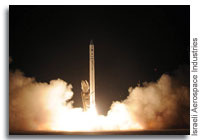Israel Space Program Update
 Military Space Drives Israel Space Program for Now, Space Quarterly Magazine
Military Space Drives Israel Space Program for Now, Space Quarterly Magazine
The following article is a free sample from the current issue of Space Quarterly Magazine. It is our hope that if you enjoy this article you will consider subscribing to the magazine.
“Israel, a country of close to 8 million people with an approximate $80 million space budget, both civil and military, is ranked 9th in the world in the latest edition of Futron’s Space Competitiveness Index. This, despite having less than 1/10th the GDP than four of the countries ahead of it and 1/5th of the other four. Israel is also part of a small exclusive group of nations that has the ability to both manufacture and launch its own satellites. To say that Israel is punching above its weight is an understatement. How did it reach this status? Out of sheer necessity.”



Americans should be proud of THEIR Israeli space program since they effectively paid for it. Given the fact that US tax payers send 10s of thousands of dollars apiece to Israel for military and civilian foreign aid, totaling trillions of dollars each year, it is no surprise our own space program is being dismantled and falling apart. Shouldn’t a country getting so much of our hard earned money be using it more wisely, instead of just bolstering their egos and padding their pockets? I think the American public needs to wake up with regards all foreign aid that could be better used at home and that it should only be dealt out on an as needed basis – such as for natural disaster and humanitarian relief. Stop wasting our money.
really? trillions? each year? The US sends it’s entire budget to Israel each year? Get your facts straight. Otherwise you just sound ridiculous. More to the point, the US does support Israel with 3 billions a year. Those happen to be about 0.1% of the US budget. This must be the main reason for NASA’s financial and other issues. Right.
You must be one of those people who get a Pavlovian reaction whenever Israel comes up. Go troll elsewhere!
Trillions of dollars each year, 10s of thousands apiece? You should get your facts straight. The US gives around $3 billion per year to Israel, which has about 8 million residents. That’s about $375 each. With that said, we do give more money to Israel than any other country and $375 for every man, woman, and child is a lot of foreign aid. Still, they are doing pretty good for $80 million per year on their space program. NASA squanders 3 times that amount annually on its IT contract (was ODIN, now ACES).
Donald,
I sure hope you don’t have a job involving money!
“Trillions” a year to Israel? Dude, you are totally out of your tree.
We send a little over $2 billion a year to Egypt plus other foreign aid. And just look at their space program. Pyramid power! The love and gratitude we receive is worth it all.
“fact… trilions of dollars each year”
Wow. That was fast. And by “that” I mean loss of your credibility.
My Bad, i did mean 3 billion a year. And that means several thousands of dollars for each Israeli citizen. Ya, it may be relatively little from our pockets, but why do we need to subsidize them. Excuse the typo and confusion. Point still stands. really easy to rile you folks up isn’t it.
This is a very good article.
There’s an additional important point that should be made. The existence of a vibrant, highly capable Israeli space program can provide important benefits to NASA, if NASA only “globalized” in much the same way that many companies do now. How so?
The 1985 US Israel Free Trade Agreement created an opportunity that as far as I know has yet to be exploited. It waives the “Buy America” clause for offers made by Israeli entities to US Government. That basically means that according to US Federal Acquisition regulations, Israeli entities can bid on RFPs, NRAs, AOs, etc, assuming that the Agency doesn’t insert it’s own more restrictive language.
Why is this important? Israeli labor rates are about 1/3 of US aerospace industry labor rates. So what would cost $100M from L-M/Boeing/Ball etc, would cost about $30M from IAI or Elop. In an era of shrinking NASA budgets, here’s one way to get a little more bang for the buck on projects for which Israel has demonstrated capabilities. Sadly, most NASA procurements usually have language barring foreign offers, only allowing for foreign contributions on a no exchange of funds basis. It doesn’t have to be that way. It’s up to NASA.
Wouldn’t this take away from US jobs? I would argue this impact would be very small. First, the size of the current Israeli space infrastructure limits the extent to which it could participate. I would estimate that Israel could currently handle roughly one new satellite project every 3 years, so the extent to which it would hurt the US aerospace labor market is quite small. Second, using Israeli industrial suppliers could enable programs to move forward that otherwise couldn’t. So in a sense, using Israeli suppliers would enable some new missions to move forward that are otherwise “stuck.”
What’s missing is awareness on NASA’s part that this opportunity exists, as well as an understanding in Israel of how NASA really operates and where to go to make real connections. There have been some limited attempts in recent years, but in my view they have largely failed because of mis-matches in capabilities and players.
I say this having spent 7 years planning new missions in SMD @ NASA Hqs, over 10 years in US industry and for the last 2 years living in Israel.
There’s a great opportunity for “win-win” if leaders on both sides decide to get serious.
Mike,
This sounds like a first class idea to me, and in addition to the cost savings, it might also set a precedent which other industries can follow. What I think needs to be stressed in addition to what you’ve said, is that this is not just a money-saving or program-enabling idea, it would also create and/or save US aerospace (and other) jobs, which makes it a very different situation from those cases where US companies are simply outsourcing labor to other countries, which is solely a money-saving move and eliminates US jobs.
The catch that I see is that those people who would consider it worth looking into are generally totally powerless to make anything happen. You’d have multiple subcommittees in Congress involved who would have to be sold on it and (the biggy) they’d have to agree with one another, sometime before the next geological age, which rarely seems to happen in the US any more. Also the timing is going to be a roadblock, with 2 months to go until the election. If you, from your experience, happen to have access to the right people to get this looked at, then please, go for it. But it’s going to take patience, and it’s just a matter of time before countries other than the US figure out what you’re saying, and then that limited Israeli workforce is going to be unavailable (and raising prices) doing it for others instead of the US.
Too bad this couldn’t somehow be presented as an armament or state issue, since then a smart President could maybe quietly make it happen unilaterally, without involving Congress, like previous Presidents have done with arms reductions.
But I fear that this is another great idea that will be not be used because, in the US today, GOP partisan politics emphasizes only the “Part” portion of the word.
Steve
Thanks Steve. There’s a bit of a chicken and egg problem in how to make this happen. I don’t see this as a high-level political challenge at all. I see this as potentially being solved within NASA and and in Israel if there’s the will to make it happen. Here are two steps that could be to be taken to get the ball rolling:
(1) NASA Hqs – the current restrictive language needs to be removed that really doesn’t have to be there in procurements that usually prohibits foreign offerors from bidding. Just follow the FAR rules. Period. This opens the door.
(2) Next, Israeli entities then need to engage with the right players in the US to generate enough interest on the US side: NASA Centers, e.g., GSFC, JPL and “APL”; potential PIs in academia, and US industrial players, to secure the necessary TAAs that need to be in place for the kind of technical information exchanges needed to identify specific opportunities. This insures that ITAR rules are followed as without TAAs in place, it’s impossible to explore this at all. Right now, there’s little evidence that Israeli space business development folks know where to go or what’s needed.
If these two initial steps are taken, I believe we will see some action starting with SMD’s next AO release.
Israel should aggressively pursue becoming a full member of the ESA while launching some of its satellites from the ESA facility in Kourou. And the ESA should strongly encourage ATK/Astrium to launch some of the Liberty rockets from Kourou in French Guiana.
Marcel F. Williams
Marcel,
This has possibilities, I agree, but it would be a very calculated risk for the ESA when you consider its growing energy requirements and the fact that many ESA countries are tied to oil producing countries who are not buddies with Israel, and don’t smile on people who are. ESA could be making space a much more political issue (an a bad way) by involving themselves with Israel in anything more than token ways. Consider that the US is an ally of Israel and then count up the number of Israeli astronauts the US has flown. This may be very touchy all around — but I’d like to see it happen.
Steve
I believe that this is being pursued by the Israeli Space Agency (ISA). One challenge is that the ISA budget is limited. Full member states contribute to ESA’s budget, so the extent to which Israel could play in ESA would be limited.